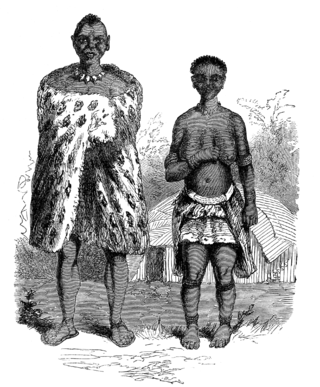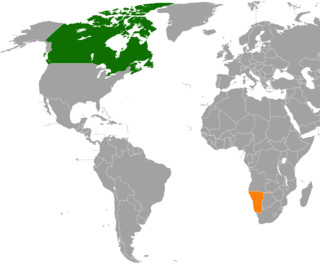Related Research Articles
The history of Namibia has passed through several distinct stages from being colonised in the late nineteenth century to Namibia's independence on 21 March 1990.

The Zambezi Region is one of the 14 regions of Namibia. It is located in the north-eastern part of the country. It is largely concurrent with the major Zambezi River after which it was named. The region has eight constituencies and its capital is the town of Katima Mulilo. The self-governed village Bukalo is also situated in this region. The Zambezi Region had a population of 90,596 in 2011. As of 2020, it had 47,884 registered voters.

The Caprivi Strip, also known simply as Caprivi, is a geographic salient protruding from the northeastern corner of Namibia. It is bordered by Botswana to the south and Angola and Zambia to the north. Namibia, Botswana and Zambia meet at a single point at the eastern tip of the Strip, which also comes within 150 m (490 ft) of Zimbabwe thus nearly forming a quadripoint. Botswana and Zambia share a 150-metre (490 ft) border at the crossing of Kazungula. The territory was acquired by then-German South West Africa in order to provide access to the Zambezi River and consequently a route to the east coast of the continent and German East Africa. The route was later found not to be navigable because of the location of the Victoria Falls, one of the world's largest waterfalls, about 65 kilometres east of the Caprivi Strip.

Khwe is a dialect continuum of the Khoe family of Namibia, Angola, Botswana, South Africa, and parts of Zambia, with some 8,000 speakers.

Katima Mulilo or simply Katima is the capital of the Zambezi Region in Namibia. It had 28,362 inhabitants in 2010, and comprises two electoral constituencies, Katima Mulilo Rural and Katima Mulilo Urban. It is located on the B8 national road on the banks of the Zambezi River in the Caprivi Strip in lush riverine vegetation with tropical birds and monkeys. The town receives an annual average rainfall of 654 millimetres (25.7 in).

The Popular Democratic Movement (PDM), formerly the Democratic Turnhalle Alliance (DTA), is an amalgamation of political parties in Namibia, registered as one singular party for representation purposes. In coalition with the United Democratic Front, it formed the official opposition in Parliament until the parliamentary elections in 2009. The party currently holds 16 seats in the Namibian National Assembly and one seat in the Namibian National Council and is the official opposition. McHenry Venaani is president of the PDM.

The Caprivi conflict was an armed conflict between the Namibian government and the Caprivi Liberation Army, a rebel group that waged a brief insurrection in 1999 for the secession of the Caprivi Strip.

Albert Mishake Muyongo is a Namibian politician and former Member of Parliament who is currently living in exile in Denmark.

Caprivi Liberation Army (CLA) is a Namibian rebel and separatist group which was established in 1994 to separate the Caprivi Strip, a region mainly inhabited by the Lozi people. It operates only in the Caprivi strip.

The MaYeyi are Bantu-speaking people of north-western Botswana and north-eastern Namibia. The Yeyi immigrated to the area in the 18th century from the north, and lived in close cooperation with the San people, or Basarwa, who had lived in the area previously. They speak ShiYeyi, a language that was influenced by the San and exhibits the characteristic clicks.
Victor Simunja is a Namibian politician. A member of the South West Africa People's Organization (SWAPO), Simunja was appointed to the National Assembly of Namibia in 2000 and served as Deputy Minister of Defense from 2000 to 2009. Simunja rose to the rank of lieutenant colonel in the Namibian Defence Force prior to entering political office. He is a member of the Mafwe ethnic group, indigenous to the Caprivi Strip.
The Caprivi treason trial is a trial in which the Government of Namibia indicted 132 people for allegedly participating in the Caprivi conflict on the side of the Caprivi Liberation Army during a period between 1992 and 2002. They were charged with high treason, murder, sedition, and many other offences, altogether 278 counts of criminal conduct.

Canada–Namibia relations are the bilateral relations between Canada and Namibia. Relations began in 1977. Both countries are members of the Commonwealth of Nations. Neither country has a resident ambassador.
Richard Kapelwa Kabajani was a Namibian activist, militant, diplomat and politician. Kabajani was a military commander for SWAPO during the Namibian War of Independence and after independence served a minister in the Namibian government.

Chinchimane is a settlement in Namibia's Caprivi Strip. It is situated approximately 70 kilometres (43 mi) southwest of the regional capital Katima Mulilo. Chinchimane belongs to the Sibbinda Constituency in Namibia's Zambezi Region.
The Masubia are a tribe in Caprivi Strip whose traditional authority (ikuta) is based in Bukalo.
Lusata Festival is an annual festival for all Mafwe tribal people of Namibia and nearby countries. The Mafwe people are one of the largest ethnic groups in the Caprivi Region. They speak ChiFwe. The festival celebrates traditional values, commemorates the past, and looks forward to the future. It occurs annually in the last week of September. The festival's name is a reference to the royal mace an ivory-encrusted stick.
The Mafwe are one of the tribal peoples of the country of Namibia, and one of the 38 groups that comprise the Lozi people. They speak the Fwe language.
Boniface Lutibezi Shufu is the chief of the Mayeyi people of Namibia. He was crowned in 1993, after the Namibian government intervened in the conflict between the Mayeyi, who wanted independence, and the Mafwe, who at the time were led by Boniface Bebi Mamili.
References
- ↑ Bader, Christian (1997). La Namibie (in French). Paris: Karthala. p. 81. ISBN 9782865376445.
- 1 2 Dierks, Klaus (2003–2004). "Biographies of Namibian Personalities".
- ↑ Kangumu, Bennett (2011). Contesting Caprivi: A History of Colonial Isolation and Regional Nationalism in Namibia. Basel Namibia studies series. Vol. 10. Basler Afrika Bibliographien. p. 270. ISBN 9783905758221. ISSN 2234-9561.
- ↑ Melber, Henning (2009). "One Namibia, one nation? The Caprivi as contested territory". Journal of Contemporary African Studies . 27 (4): 463–481. doi:10.1080/02589000903399454. S2CID 144750882.